 International Law and Cannabis I
International Law and Cannabis I Book contents
- Frontmatter
- Preface
- Contents
- List of Cases
- List of Abbreviations
- Chapter 1 Introduction
- Chapter 2 Obligations under International Law Regarding Cannabis: UN Narcotic Drugs Conventions
- Chapter 3 Obligations under European Law Regarding Cannabis: EU Laws on Drugs
- Chapter 4 Assessment of the Arguments and Initiatives Regarding Regulation of Cannabis Cultivation
- Chapter 5 Conclusion
- Bibliography
- Executive Summary of Volume II
- About the Authors
Chapter 1 - Introduction
Published online by Cambridge University Press: 09 November 2019
- Frontmatter
- Preface
- Contents
- List of Cases
- List of Abbreviations
- Chapter 1 Introduction
- Chapter 2 Obligations under International Law Regarding Cannabis: UN Narcotic Drugs Conventions
- Chapter 3 Obligations under European Law Regarding Cannabis: EU Laws on Drugs
- Chapter 4 Assessment of the Arguments and Initiatives Regarding Regulation of Cannabis Cultivation
- Chapter 5 Conclusion
- Bibliography
- Executive Summary of Volume II
- About the Authors
Summary
RATIONALE FOR AND PURPOSE OF THE BOOK
The policy of tolerance regarding the sale of cannabis (marijuana/hemp/weed, grass and hash) in so-called coffee shops in the Netherlands continues to confront society, the authorities and supporters and opponents of this policy with difficult questions. An important issue is that the cultivation of cannabis to supply coffee shops does not form part of the policy and is therefore completely illegal. This is sometimes referred to as the back-door problem (as deliveries to a coffee shop would take place at the back door). The resulting ambivalent situation around coffee shops leads to much dismay and discussion, including in the Dutch parliament. That discussion is partly about arguments and concrete plans of Dutch municipalities to arrive at regulated cannabis cultivation, as well as initiatives in other countries, which aim to provide such regulation. The discussion led to a promise by the Dutch Minister of Justice and Security to the Parliament to have the recent national and international developments and schemes in the area of cannabis cultivation assessed in the light of international legal frameworks arising from the UN narcotic drugs conventions and from relevant EU law. Until now, the position of the Dutch government on legalizing or regulating in another way the cultivation of cannabis for recreational use has been based on the findings in a report of the T.M.C. Asser Institute from 2005. The conclusion of this report is that under international law there is no room to permit the cultivation of cannabis for the supply of retail shops. The above-mentioned arguments and initiatives from within municipalities and also in other countries were the reason to carry out the further analysis of international law and an assessment based on this law. That is what we do in this research. This does not involve only the above-mentioned problems of supplying coffee shops, but also new developments, such as joint cultivation and consumption in so-called Cannabis Social Clubs.
DEFINITION OF THE CENTRAL PROBLEM
Against the background outlined above, the key question of this research is the following:
To what extent are initiatives regarding the legalization, decriminalization, policy-based tolerance and/or other forms of regulation of cannabis cultivation for recreational use compatible with applicable international law as laid down in the UN narcotic drugs conventions and in European Union law?
- Type
- Chapter
- Information
- International Law and Cannabis IRegulation of Cannabis Cultivation for Recreational Use under the UN Narcotic Drugs Conventions and the EU Legal Instruments in Anti-Drugs Policy, pp. 1 - 10Publisher: IntersentiaPrint publication year: 2019


